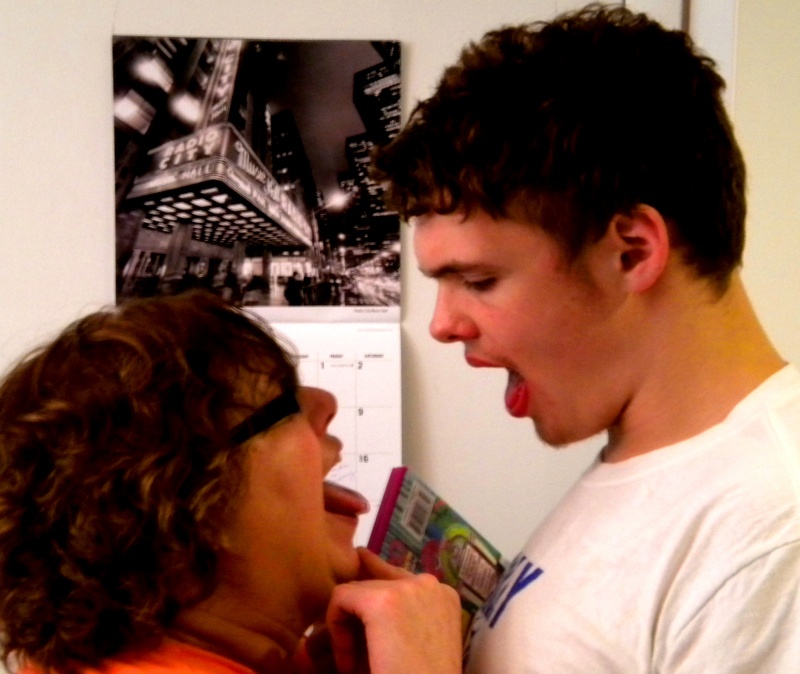Ben’s tongue is something he shows to two sets of people: Doctors, and people he really likes.
Doctors, of course, because it’s a routine part of an exam, and he likes opening his mouth and saying “Ahhh” when requested, or having the stethoscope check his heartbeat.
But the tongue thing — I don’t really know where that came from. There certainly isn’t anything sexual about it.
On the receiving end, Ben’s always been fascinated by tongues. This is how I began a piece back when Ben was seven:
Hunching down in a kitchen chair, I am eye-level with my son Ben as he stands, face inches from mine, beaming with anticipation that I will honor his request. “Neigh . . . ,” he intones, waiting for me to imitate a horse. As I deliver a hearty and protracted whinny, his eyes move closer to my mouth, staring inside, transfixed with fascination, his voice quivering and squealing with delight. The events quickly repeat, and this time his fingers find their way into my mouth and to the top of my tongue, and as he makes contact with the wet and slippery surface, his eyes narrow slightly with a hint of revulsion, followed immediately by more excited laughter.
Three minutes later, he is in the den sitting on the couch, his face inches from the family dog’s. Ben, grinning widely, stares into her mouth. In go the fingers, reaching for her tongue. Nonplussed, she continues panting. He looks into her eyes and implores: “Say neigh to me.”
So, he’s always had a thing for tongues. You can tell that Ben really, really likes you if he looks you in the eye, sticks out his tongue, wags it slowly back and forth, and waits for you to do the same. If you don’t know what the heck’s going on, he might gently put his finger on your chin to help you open your mouth to get that tongue out. Yeah, it can look a little weird, but that’s autism for you.
After the tongue exchange is done, kind of like a secret handshake, Ben’s happy and things move on, which might mean he’s done interacting with you and walk away.
Ben also has, we think, a touch of what’s known as “face blindness,” but only slightly, because he does recognize people pretty normally. But he also mistakes strangers for people he knows.
Not long ago in Five Guys Burgers, a sizable man was standing waiting for his food when Ben walked up and quickly turned and backed up into him, saying “On my back please.” It’s his way of requesting a bear hug that will, hopefully, lift him off his feet for as long as possible (Ben’s over 6 feet, and it takes some effort). It’s also known as “deep pressure.” It’s a common craving for many people on the spectrum, a way of relieving tension.
But it’s not exactly common for a stranger to have a 23 year old guy come up and do an about face and back into you requesting a squeeze. It’s one of countless reasons why Ben is never in public without close accompaniment. Even then, things can happen quickly, and I was instantly apologizing and saying, “He thinks he knows you, I’m sorry, he’s looking for a bear hug…” blah blah blah for the hundredth time. Usually, as in this case, the person gets a sense of the reality, and will say “That’s OK,” or “No problem,” and in fact often will nod or smile and say something about having an autistic brother or cousin or nephew. (Yeah, the autism epidemic doesn’t really exist, my foot.)
And so this past weekend, the elevator door in our apartment building opened and as we were exiting, three pretty and friendly young ladies smiled at us as they were about to get in. Ben has had pretty and friendly young ladies as therapists, aides, house “mothers,” and teachers smiling at him his whole life. I have often referred to them as his guardian angels (either gender). And he must have thought he knew one of them.
Out came the waggling tongue as he started bending over closer to her face. We were right next to him so it was only for an instant, not even long enough for her to stop smiling but long enough for her to stare up at him with the beginning of a look that said, through the smile, “WTF?” Karen and I blurted over one another in a word stew, “I’m sorry, he thinks he knows you…” (me, as if that really explained anything), and “I’m sorry, he’s disabled…” (Karen, with something that made a little more sense) as we whisked him away.
And she said, truly cheerfully, “Oh that’s OK,” meaning, luckily, she got it. It does help that Ben really is an adorable little big guy, and does not appear menacing or aggressive, but more a big, smiling teddy bear.
Even when he’s a teddy bear wagging his tongue at you.
~~~

Ben and Karen, 2010
Also on Huffington Post
